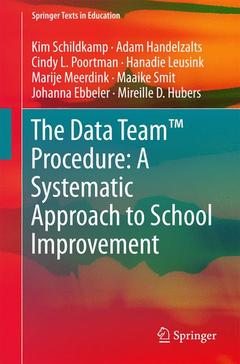The Data Team™ Procedure: A Systematic Approach to School Improvement, 1st ed. 2018 Springer Texts in Education Series

Divided into three parts, the book first describes the importance of data use and the data team procedure. Next, it describes two cases. The first case concerns a data team working on a school level problem: Reducing grade repetition. The second case concerns a data team working on a classroom level problem: low student achievement in English language. The last part of the book explains what it means to implement the data team procedure in the school, the conditions needed for implementing the data team procedure, and the factors that may hinder or support the use of data in data teams.
Preface: Data teams can make a difference; Lorna Earl & Helen Timperley.- Introduction: Data use with the data team™ procedure.- Part 1: The eight steps of the data team™ procedure.- 1. Step 1: Defining the problem.- 2. Step 2: Drawing up hypotheses.- 3. Step 3: Collecting data.- 4. Step 4: Verifying the quality of collected data.- 5. Step 5: Data analysis.- 6. Step 6: Interpretation and conclusion.- 7. Step 7: Taking measures.- 8. Step 8: Evaluation.- Part 2: Two examples of the data team™ procedure: Graduation rates and English language results.- 9. Case study: High school graduation rates.- 10. Case study: English language results.- Part 3: Integration into the organization.- 11. Introducing the data team™ procedure in schools.- 12. The road to sustainability.- Acknowledgements.- References.
Dr. Adam Handelzalts is the managing director of the teacher education department at the Vrije Universiteit Amsterdam. His research and practice concentrates on initial teacher education and the continuing professional development of teachers throughout their career.
Dr. Cindy Poortman isan assistant professor at the University of Twente, department of Teacher Development. Her research focuses on teacher professional development in Professional Learning Networks. She is the project leader of a national project ‘Pilots for the development of professional learning communities’, and the co-project leader of the Datateam Projects. She has published in books and scientific journals about teacher professional development in learning networks and specifically data teams, and was the main editor for a special issue about effects of professional development in data use for Teaching and Teacher Education (2016).Hanadie Leusink, MSc. has a background in public
Presents one of the few interventions with regard to data use, proven to be effective
Describes an approach that can be used in a wide range of different contexts and countries
Provides the reader with concrete steps and examples
Includes supplementary material: sn.pub/extras
Date de parution : 07-2017
Ouvrage de 84 p.
15.5x23.5 cm
Thèmes de The Data Team™ Procedure: A Systematic Approach to... :
Mots-clés :
collect data on grade repetition; research in schools; quantitative school data; classroom observations; school improvement; data-driven decision making; professional development; improve English achievement results; data-based decision making; implement the data team procedure in the school; learning and instruction



